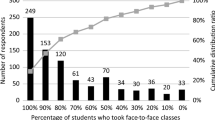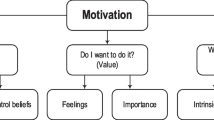Conclusion
In terms of the University of Edinburgh, there are lessons for us from our data, plus some insights from recent surveys and interviews we have conducted with various groups around the university.
New students’ reporting of apprehensiveness with respect to use of ICT in their studies has been falling over the years, but now appears to be reaching a stable baseline, perhaps reflecting a group in our population with general apprehensiveness about university life and studies. The steadily rising temale:male ratio in our undergraduate population will tend to exacerbate this issue. One approach which we could take would he to give more information to prospective students about the extent and types of use of ICT in their courses, and to focus in on this topic in the early days and weeks of the first term. Another approach is to provide more explicit guidance to students about the sorts and levels of skills we expect graduates to achieve. We know that students leaving the university for professions such as teaching, medicine and law are more confident about the match between their future employers’ needs than are other students, probably because the courses leading to professional qualifications are more explicit than are more “academic” subjects. Provision of materials to enable students to self-assess their skills against objective tasks might enable men and women to become more accurate in their self-reporting of skills. The formal demonstration (even to oneself) of one’s ICT skills may be more of a support to the technological confidence of women than of men. Although the point applies equally to any students who are anxious about their skills in this domain: self assessment is more important to those low in confidence than to those high in confidence. An example of such objective testing can be found in the European Computer Driving Licence (www.ecdl.org). At present, the university favours integration of ICT skills development into academic studies, which although good for encouraging engagement by its relevance, may well make wider and generic self-assessment more difficult.
Interviews with technical support staff who come into direct contact with students in the university microlabs and who run the voluntary courses provided in the first weeks of the academic year, have provided us with useful insights into gender differences in requests for assistance. Although most students appear to turn first to peers tor help (something we have observed in other studies), females are more willing to ask for assistance, and particularly with technical problems, than are males who may view such difficulties as “something they should be able to solve”. The great majority of our student technical support staff are males, and this in itself may raise barriers for the increasing proportion of female students in the university. Seeking costeffective ways to provide appropriate assistance will continue to be an issue for us over the coming years.
Similar content being viewed by others
References
Bjorkman, C., Christoff, I., Palm, F., & Vallin, A. (1997).Exploring the pipeline: towards an understanding of the male dominated computing culture and its influence on women. In R. Lander &. A. Adam (Eds.), Women in computing (pp. 50–59). Exeter, England: Intellect Books.
Bromley, H. (1998).Data-Driven Democracy? Social Assessment of Educational Computing. In H. Bromley & M. W. Apple (Eds.), Education, technology, power: educational computing as a social practice. Albany: State University of New York Press.
Colwell, J., Grady, C., & Rhaiti, S. (1995). Computer games, self-esteem, and gratification of needs in adolescents,journal of Community and Applied Social Psychology, 5, 195 -206.
Dumdell, A., Macleod, H., & Siann, G. (1987). A survey of attitudes to, knowledge about and experience of computers.Computer Education, 11(3), 167–175.
De Lacy, J. (1989).The sexycomputer. In Foster, T., (Eds) Computers in the Human Context (pp 228–236) Basil Blackwell Ltd.
Margolis, J., & Fisher, A. (2002). Unlocking the clubhouse: women in computing. Cambridge, Massachusetts: MIT Press.
Phillips, C. A., Rolls, S., Rouse, A., & Griffiths, M. (1995). Home video game playing in schoolchildren: a study of theO incidence and patterns of play.Journal of Adolescence, 18, 687–691.
Weinstein, M. (1998).Computer advertising and the construction of gender. In H. Bromley & M. W. Apple (Eds.), Education, technology, power: educational computing as a social practice (pp. 85–100). Albany: State University of New York Press.
Wilson, F. (1997). Computing, computer science and computer scientists: how they are perceived. In R. Lander & A. Adam (Eds.),Women in computing (pp. 122–133). Exeter, England: Intellect Books.
Author information
Authors and Affiliations
Corresponding author
Additional information
His interests are in scaling-up from eLearning projects to full institutional implementation, and in evaluation of local, national and international eLearning innovations.
His interests are in the uses of information technology, particularly computermediated communications, in teaching and learning, and the question of what it means for an undergraduate to be “information literate”.
Her work on evaluating the effectiveness of using ICT in learning situations and surveying university student and staff skills and attitudes across Europe, has led to an interest in the effects that eLearning has on individuals and in particular on the nature of informal support.
His research centres on student learning in higher education and he has been involved in a number of projects evaluating the use of ICT in higher education settings, with a particular focus on issues relating to evaluation methodology.
Rights and permissions
About this article
Cite this article
Macleod, H., Haywood, D., Haywood, J. et al. Gender & information & communications technology-A 10-year study of new undergraduates. TECHTRENDS TECH TRENDS 46, 11–15 (2002). https://doi.org/10.1007/BF02824154
Published:
Issue Date:
DOI: https://doi.org/10.1007/BF02824154




